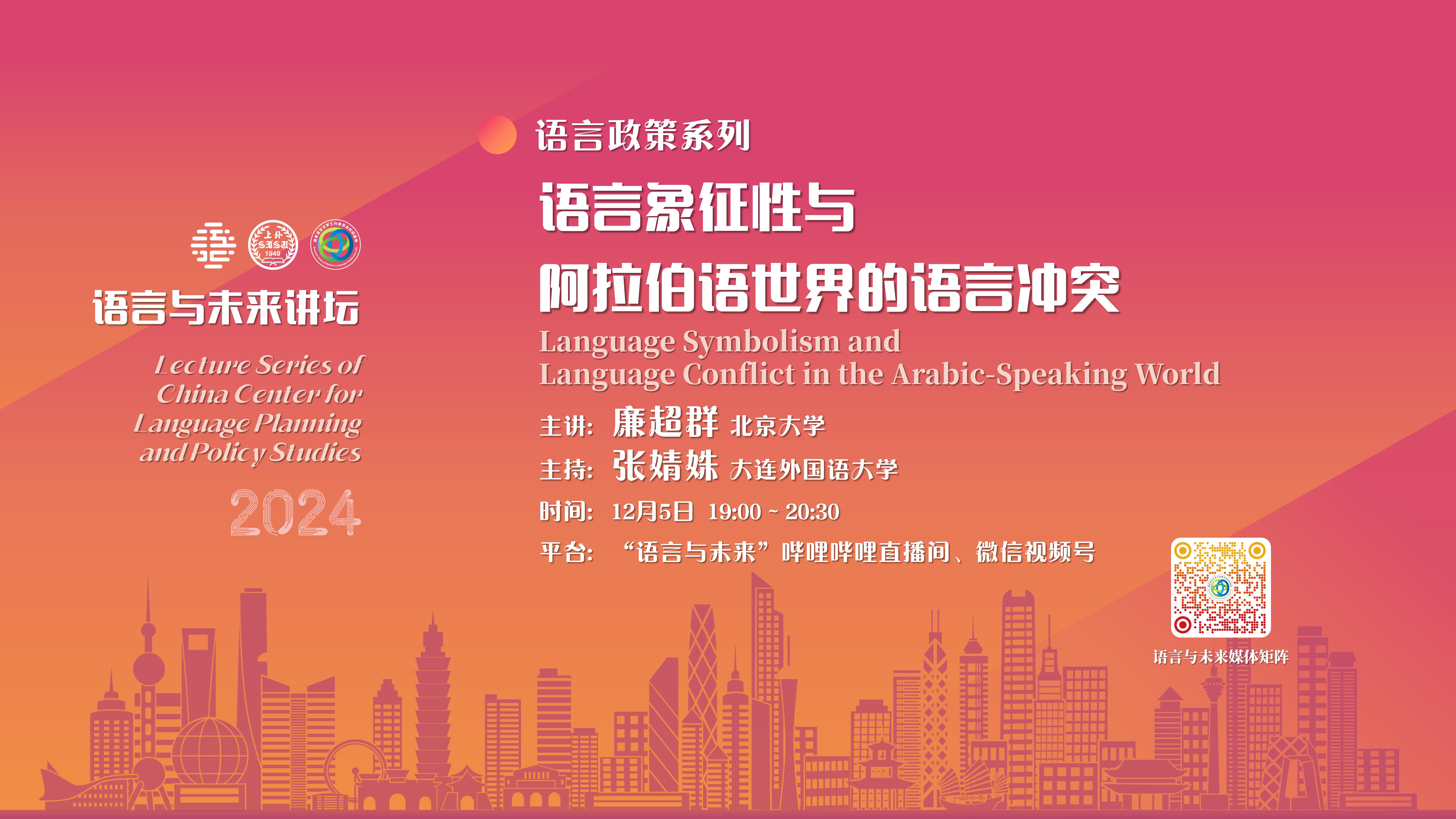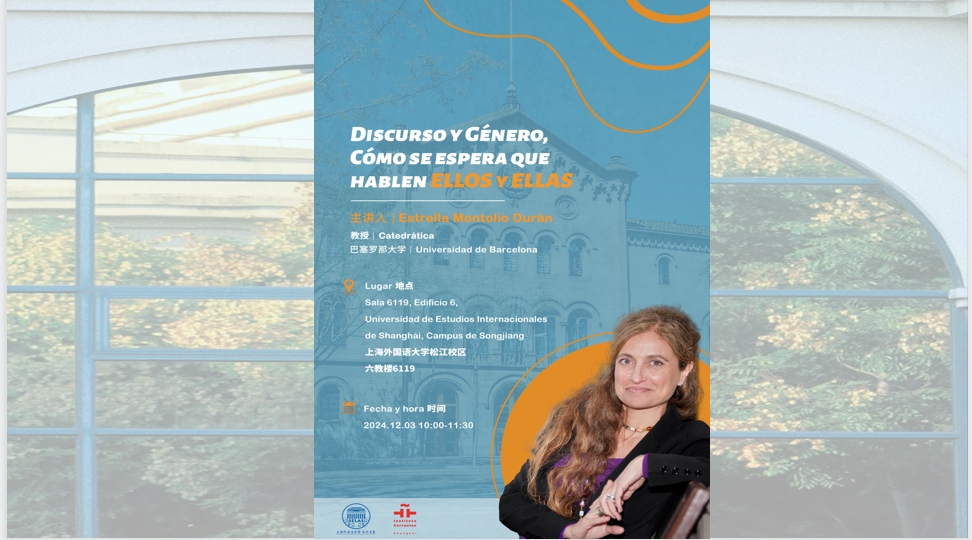
王玉主
中国社科院亚太与全球战略研究院区域合作研究室主任、研究员,中国亚洲太平洋学会秘书长。
新闻报道


中国社科院亚太与全球战略研究院区域合作研究室主任、研究员,中国亚洲太平洋学会秘书长。
新闻报道

在这个讲座中,我基于阿拉伯语世界语言冲突的经验,用语言象征性概念重新审视以Nelde语言冲突研究基本原则为代表的既有语言冲突理论,指出伴随语言交际的语言评价与赋值,是在意识形态层面构建语言同集体身份与社会–政治价值关联的主要渠道,而围绕语言关联的集体身份与社会–政治价值的冲突是语言冲突的主要内容,语言冲突由此同社会–政治冲突构成象征性关联,成为后者的代理。维持语言冲突的象征性具有稳定冲突下社会–政治结构的效应,而语言冲突的去象征化将有可能激化既有社会–政治冲突。在用语言象征性分析阿拉伯语世界语言冲突现象的过程中,我还将详细解释语言象征性的机制与学理脉络,分析语言象征性同指向性、呈符化等概念的联系与区别,说明语言象征性如何有助于进一步理解语言的社会–政治属性和功用。
获取更多与本讲座相关的详细信息,敬请关注中国外语战略研究中心公众号“语言与未来”(ID: SISU_CCLPPS)的微信推送。
北京大学外国语学院阿拉伯语系长聘副教授、研究员。北京大学阿拉伯语系学士、硕士,剑桥大学中东研究系硕士、博士,曾赴叙利亚大马士革大学、黎巴嫩贝鲁特美国大学访学。现任中国社会语言学会理事、中国阿拉伯文学研究会理事、中国非洲史学会理事、北京大学非洲研究中心副秘书长、剑桥大学伊斯兰研究中心访问研究员。主要研究领域为阿拉伯语社会语言学、中东语言与政治。出版专著《阿拉伯语世界的语言、意识形态与社会政治变迁》(英文,爱丁堡大学出版社,2020年)。
新闻报道

Tassos Lampropoulos, a poet, writer, and
thinker born in Athens and based in Shanghai,
has studied philosophy for over 20 years. He has published two poetry collections: Greek-Erotic-Contemplative Poems (1993) and Poetic Omovrontia (1997). His poem "Alexander" won second prize at the National Delphi Poetry Contest. His historical novel The Daughter of the Sun was released in Greece in 2022 and translated into Chinese in 2023. The English version will be available in 2025. His latest novel, Stairway to Heaven, was published in 2023, and his new book, The Light of Two Worlds, was released in Greece in 2024. Lampropoulos' works explore philosophical and cultural themes connecting Greece and China.
新闻报道

从沟通学的角度看,在一场两性都参与的会议中会发生什么?谁最常打断谁的发言?语言学专家、巴塞罗那大学教授埃斯特蕾娅·蒙托利奥将为大家解答这些两性之间沟通时会出现的问题。
埃斯特蕾娅·蒙托利奥是巴塞罗那大学的西班牙语言学教授兼沟通顾问,同时担任巴塞罗那大学-巴塞罗那省议会主席团沟通管理教席主任,以及学术与专业话术(EDAP)研究小组的首席研究员。
新闻报道

结合自己的翻译实践,探讨中国特色政治用语和文化表述的英译基本思路。强调术语翻译是一门跨学科的学问。呼吁培养更多熟悉中国对外翻译的人才队伍。
黄友义,中国翻译协会常务副会长、中国翻译研究院副院长、全国翻译资格(水平)考试英语专家委员会主任、全国翻译系列高级职称任职资格评审委员会主任,曾任国务院学位委员会委员、中国翻译协会秘书长、《中国翻译》杂志主编。长期在对外翻译出版领域工作,曾多次为党和国家领导人担任口译,长期参加党政文件和领导人讲话的翻译和译文审定工作,出版多部译著,并完成数百万字的中译英书稿核定工作。近年参与的英文稿核定工作包括《习近平谈治国理政》(一至四卷)、《习近平著作选读》(一、二卷)。最新作品为《从“翻译世界”到“翻译中国”——对外传播与翻译实践文集》。
新闻报道

中国社科院中国式现代化研究院中外比较部主任、研究员,新兴经济体研究会秘书
新闻报道

宋庆龄故居研究部主任
新闻报道

充分利用并扩大教育技术学专业优势,走进企业培训。
上海外国语大学教育技术学专业毕业生,亚萨合莱(中国)投资有限公司人力资源专员,学习与发展业务伙伴。
新闻报道

本次工作坊涵盖了学习科学领域的重要内容。从 9:30 至 10:30 开启学习科学导论环节,将对学习科学的基本概念等进行初步介绍,帮助参会者构建起对该学科的基础认知框架。11:00 到 12:00 则聚焦于学习科学研究方法(一),着重探讨该领域常用研究方法中的部分基础且关键的方法类别。14:00 至 15:00 继续深入学习科学研究方法(二),进一步阐述其他相关研究方法,助力参会者全面深入地理解学习科学的研究方法论体系。
吕教授于英国爱丁堡大学取得人工智能专业博士学位,并专注研究学习科学、计算机支援合作学习、移动学习、人工智能教育,以及运算思维等范畴。吕教授著作超过一百二十篇国际期刊文章、五十多本书籍或章节,以及一百六十篇国际会议论文。吕教授现为International Society of Learning Sciences以及Asia-Pacific Society for Computers in Education会士。吕教授亦曾于二零一七至二零一九年间担任Global Chinese Society for Computers in Education会长。
新闻报道

围绕高校智库研究工作的最新要求、专报开发撰写的基本规范等,阐述高质量研究型决策咨询专报的选题来源、选题类型、撰写方法、注意事项等,并与在座师生互动交流。
上海大学管理学院教授、博士生导师,上海大学人文社科处副处长、智库管理办公室主任,入选上海市曙光计划、上海市浦江人才计划等。兼任中国软科学研究会理事、中国信息经济学会数字经济创新专委会副秘书长、中国科学学与科技政策研究会数字创新管理专业委员会委员等,获得首届“上海市优秀智库报告”、第十四届上海市决策咨询研究成果奖一等奖、北京市第十六届哲学社会科学优秀成果奖(调研报告类)二等奖等决策咨询类奖项。
新闻报道